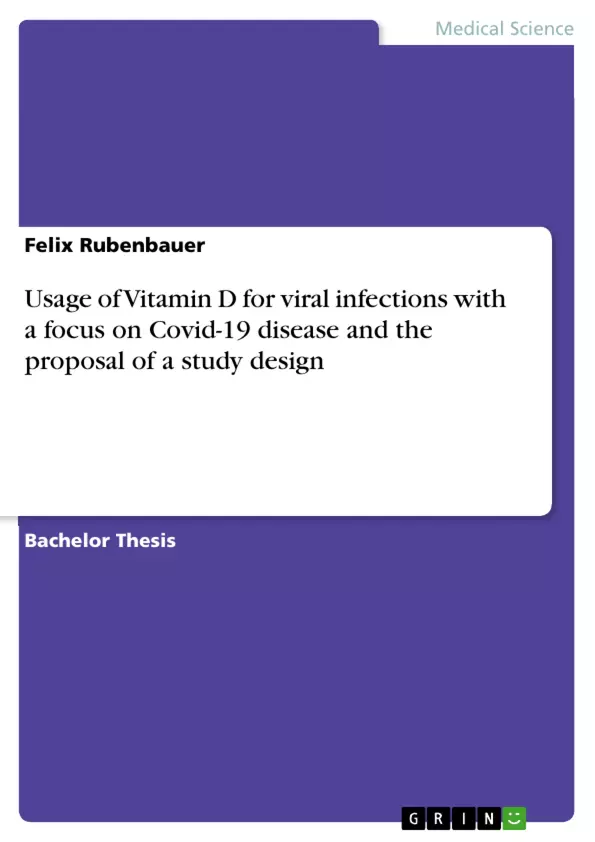In recent years, the popularity of vitamin D has risen in the alternative medicine spectrum as a “universal” substance for all sorts of diseases. Although many of the claims cannot be backed by scientific evidence, strong evidence still demonstrates the beneficial effects of vitamin D for treating various conditions that are not directly related to hypovitaminosis. Currently, there is evidence that demonstrates that the supplementation of vitamin D can prevent or relieve upper respiratory infections and endemic influenza. Additionally, herpesviruses are responsive to treatments that incorporate vitamin D, and antibody titers seem to be higher in individuals with higher vitamin D levels. For viral hepatitis, viral DNA load and seasonal fluctuating vitamin D levels seem to correlate with each other. Regarding Covid-19, there is a clear correlation between the disease’s course and duration and vitamin D serum levels. However, it remains unclear whether low vitamin D levels can increase an individual’s susceptibility to Covid-19 or whether Covid-19 causes low vitamin D levels. Furthermore, it is unclear whether a part of Covid-19’s typical symptoms could be caused by a vitamin D deficiency. To uncover high-quality evidence regarding this topic, the author proposed a clinical trial to evaluate the effects of vitamin D supplementation on Covid-19 hospitalisation rates.
Inhaltsverzeichnis (Table of Contents)
- Abstract
- Introduction
- Vitamin D
- Physiology
- Effects on the Immune System
- Vitamin D and Viral Infections
- Vitamin D in upper respiratory tract infections
- Vitamin D and Influenza
- Vitamin D and Herpesviruses
- Vitamin D and HIV
- Vitamin D and Viral Hepatitis
- Vitamin D and the Covid-19 Disease
- Covid-19
- Covid-19 Pathophysiology
- Treatment of the Covid-19 Disease
- Prevention of the Covid-19 Disease
- Long Covid and Post-Covid
- Covid-19 and Vitamin D
- Study Synopsis
- Background
- Methods
- Aims
- Design
- Low-Dose Intervention Group
- High-Dose Intervention Group
- Eligibility criteria
- Control group
- Recruitment process
- Assessment
- Analyses
- Ethical considerations
- Conclusions
- Resources
Zielsetzung und Themenschwerpunkte (Objectives and Key Themes)
This paper explores the potential benefits of vitamin D supplementation in the prevention and treatment of common viral infections, particularly focusing on Covid-19. It delves into the physiological mechanisms by which vitamin D may impact the immune system and examines the existing evidence for its efficacy in various viral infections. The paper proposes a clinical trial design to investigate the impact of vitamin D supplementation on Covid-19 hospitalization rates.
- The role of vitamin D in the immune system and its potential impact on viral infections.
- The evidence supporting the use of vitamin D for the prevention and treatment of viral infections, including upper respiratory infections, influenza, herpesviruses, HIV, and viral hepatitis.
- The specific relationship between vitamin D and Covid-19, including its potential impact on disease severity and hospitalization rates.
- The rationale for conducting a clinical trial to evaluate the efficacy of vitamin D supplementation in Covid-19 patients.
- The proposed study design, methodology, and ethical considerations for the clinical trial.
Zusammenfassung der Kapitel (Chapter Summaries)
The introductory chapter establishes the importance of vitamin D in calcium metabolism and explores its potential benefits for general health and the immune system, citing recent research findings. It also introduces Covid-19, outlining its global impact, symptoms, and the emergence of vaccine-resistant variants.
The chapter dedicated to vitamin D provides a comprehensive overview of its physiology, highlighting the processes involved in its production, absorption, and activation. It explores the various ways in which vitamin D interacts with the immune system and reviews existing evidence for its efficacy in treating and preventing a range of viral infections, including upper respiratory tract infections, influenza, herpesviruses, HIV, and viral hepatitis.
The chapter on Covid-19 provides a detailed overview of the disease's pathophysiology, including its mechanisms of infection and progression. It explores different treatment approaches for Covid-19 and discusses preventive measures. The chapter concludes by examining the relationship between vitamin D and Covid-19, highlighting the need for further research to clarify the role of vitamin D in influencing disease severity and hospitalization rates.
The study synopsis chapter outlines the background, objectives, methods, and ethical considerations for a proposed clinical trial investigating the efficacy of vitamin D supplementation in reducing Covid-19 hospitalization rates. It details the trial design, including the intervention groups, eligibility criteria, control group, recruitment process, assessment procedures, and planned data analysis.
Schlüsselwörter (Keywords)
Vitamin D, immune system, viral infections, Covid-19, hospitalization rates, clinical trial, supplementation, prevention, treatment, pathophysiology, SARS-CoV-2, hypovitaminosis D, upper respiratory tract infections, influenza, herpesviruses, HIV, viral hepatitis.
Frequently Asked Questions
How does Vitamin D influence the immune system?
Vitamin D acts as an immune modulator. It can enhance the pathogen-fighting effects of monocytes and macrophages and decrease inflammation, which is crucial for fighting viral infections.
Can Vitamin D prevent upper respiratory tract infections?
Evidence suggests that Vitamin D supplementation can help prevent or relieve symptoms of upper respiratory infections and endemic influenza, especially in individuals with a deficiency.
What is the link between Vitamin D and Covid-19?
Studies show a correlation between low Vitamin D serum levels and more severe Covid-19 courses. However, it is still debated whether low levels are a cause or a consequence of the disease.
Is Vitamin D effective against herpesviruses or hepatitis?
Research indicates that herpesviruses may respond to treatments incorporating Vitamin D, and seasonal fluctuations in Vitamin D levels often correlate with viral DNA loads in hepatitis patients.
What is the goal of the proposed clinical trial?
The proposed trial aims to evaluate whether high-dose Vitamin D supplementation can significantly reduce hospitalization rates for patients diagnosed with Covid-19.
- Quote paper
- Felix Rubenbauer (Author), 2021, Usage of Vitamin D for viral infections with a focus on Covid-19 disease and the proposal of a study design, Munich, GRIN Verlag, https://www.grin.com/document/1281745



